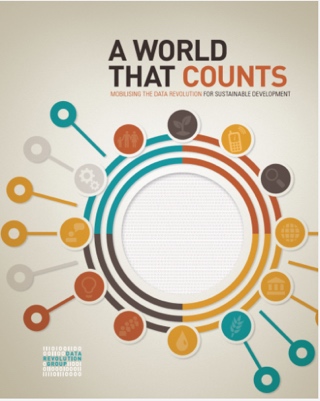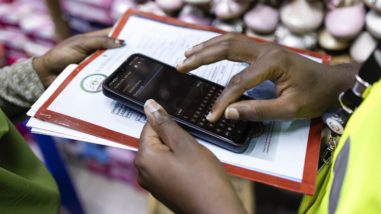(This blog post appeared, in slightly different from, on Post2015.org earlier this week. It is adapted from my remarks at the January 22 UN Foundation and World Bank hosted consultation on financing the data revolution. It’s not too late to comment on the background papers. )
Now, with less than six months until the Financing for Development (FFD) conference in Addis Ababa—a critical juncture in the Post-2105 process, we are finally starting to talk about how to finance the data revolution. As these conversations take shape, I see a collective to-do list emerging, both in creating a financing mechanism commensurate with the spirit of the Data Revolution, and in making FFD a success for the Data Revolution.
Financing for the Data Revolution – 4 Essential Ingredients
Recognizing that no single financing instrument will meet all the needs identified by the data revolution, I believe any instrument (existing, repurposed, or new), would need these four ingredients:
1. Credible and inclusive governance
The Data Revolution is meant to speak to a wide variety of players—national statistical offices, government leaders, private sector actors, data innovators, donors, civil society advocates, and so on. So while a given financing mechanism has to be housed in one place, it shouldn’t only reflect the priorities of that one place—a multi-donor trust fund housed at the World Bank, for example, would need guidance from and accountability to actors beyond the Bank. What lessons can we learn from other trust funds’ governance structures to help balance accountability to the home institution with accountability to the different actors it is meant to include and to serve?
2. Ability to bring together different strands
Some of the most interesting data applications will be those that bring together traditional and new data sources and actors. While a financing mechanism may have a window for strengthening core statistical capacity, one for innovation, and one for data literacy, it will be important for there to be interaction among them. UN Global Pulse offers a number of examples of these synergies, such as using data extracted from cellphone airtime credit purchases (or “top-ups”) and mobile phone activity as proxy indicators for food security based on their close correlation with results of nationwide household surveys of food consumption. Another example may be using cell phone and satellite data to complement census data to understand shorter-term, real-time population trends or fill gaps in hard-to-reach places (described here and here).
3. Clarity on what the market is—but not too much
Creators of, and contributors to, a financing instrument should have a clear sense of their target market —in terms of the groups that will access their funds (and these groups can’t just be country governments), who these groups are trying to help, and what problems they are trying to solve. For example, if one aim is to foster greater data literacy, who do we have in mind? The average citizen? Civil society groups, journalists, and other intermediaries? Government officials? Do we have a theory about which approaches work best with different audiences?
On the other hand, we can’t predict all the questions that new data sources can help us answer until we dive in and get a closer look at them. While we should have a problem-focused, results-based approach, we must also make room for a more inquisitive, exploratory approach as well—one more focused on learning than on specific results.
4. Ability to create incentives for change beyond the projects it funds
Many point to Gavi, The Vaccine Alliance, as a success both in terms of attracting increased funding for vaccines, and in bringing together public and private partners to do so. One of the most striking features of GAVI, beyond the activities it funds, is that it has influenced the markets for vaccines by the way it operates.
While I don’t think we want a GAVI for data, we should think about the indirect effects we hope a new funding mechanism can trigger. For example, if there is a need to strengthen incentives and global norms for responsible data sharing, how could we design the instrument to have this knock-on effect?
Making FFD a Success for the Data Revolution – 3 Essential Ingredients
Assuming that we want to have the contours of the financing instrument in advance of FFD, and a broad community advocating for it, and funders willing to fund it, we need more than the instrument itself. I think we need at least three additional pieces:
1. Country champions
The FFD agenda and outcome document will be shaped first and foremost by the countries involved in the negotiations. This means we need country champions who will put a broad data revolution agenda on the table for FFD. To champion a “broad data revolution agenda,” means to push for more than just measuring the SDGs, or just open data commitments, or just capacity building for national statistical organizations. It means also championing the importance of both traditional and new data sources to better understand and address development challenges, and the partnerships necessary to do so.
Who will these champions be? Identifying, informing and encouraging these champions will require understanding the politics of the FFD negotiations, and helping tip the political balance in favor of empowering the champions on these issues.
2. A broad community of advocates
Having a broad agenda for the data revolution at FFD also requires having a broad advocacy community behind it. It won’t be enough if one camp is pushing only SDG measurement; one pushing only open data; one pushing only citizen-generated data, and so on. While I would never want (or think we could achieve) a single message from all corners of the advocacy world, I do think folks can do a better job of coming together. Here are three ways to start:
- Connect. Let’s make sure the data-for-development, big data, and open data communities are taking to each other more. For example, one set is organizing the Cartagena Data Festival in April and another set is organizing the Ottawa International Open Data Conference in May. At the very least, let’s make sure these groups are informing and attending each other’s events, and communicating their ideas to inspire and inform more country champions.
- Learn. Let’s look at the accountability mechanisms advancing open data and transparency, such as the Open Government Partnership and the International Extractives Transparency Initiative– and see how they have succeeded in turning global principles into local, concrete and accountable action. There are likely some lessons there for the data revolution.
- Expand. Let’s break outside of DC, New York and London, where much of the data revolution energy was centered last year. One good step was last week’s event on Building Capacity for African development Data in Nairobi, hosted by the Partnership for African Social and Governance Research where according to Claire Melamed, “ we aren’t agonizing about what [the data revolution] is, and just about how to do it!”. Let’s hope the Economic Commission for Africa’s data revolution event in March builds on this “how to” momentum.
3. Answers to some of the toughest questions
Even the best champions and advocates need answers to the tough questions that skeptics raise. We’ll have a better case to make at FFD if some of these tough questions start to get answered publicly:
- How much is data revolution going to cost? And how much will it save? Thanks to SDSN we’ll have a typology to assess the costs of SDG monitoring and statistical capacity development, two pieces of the data revolution. But an important unanswered question is – how much will the data revolution save in terms more efficient budget allocation, program design and policy implementation informed by better data? The goal should be to have an informed cost/benefit discussion about new data investments, not just a one-sided look at costs.
- What is the right balance between individual privacy and public good? There is a lot of uncharted territory in terms of managing the privacy, ethical and proprietary issues related to sharing big data sources, as vividly illustrated during the West Africa Ebola crisis. Thanks to World Economic Forum’s Data Driven Development report and the authors of one of the World Bank/UNF consultation papers for helping move balanced discussion of the risk/reward equation. The big question is how to advance global frameworks to help strike this balance? What can we do by FFD to show that a healthy balance is possible and will be different for different data sources and uses?
This is quite a to-do list before FFD. Please spread the word if you are working on any of these essential factors and questions. We’ll only get through this critical list if we work together.



